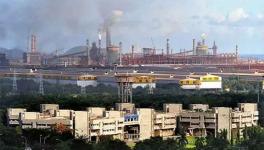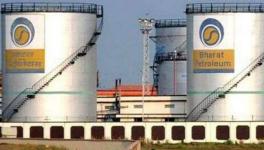BPCL Disinvestment: Vedanta Group Likely to Compete for Acquisition

Image Courtesy: Reuters
Vedanta Group has finally announced their interest in the state-run Bharat Petroleum Corporation Limited (BPCL), as the government plans to disinvest from the public sector undertaking (PSU) by the end of financial year 2019-20. Recently, the executive chairman of the Vedanta Group, Anil Agarwal, said that the group will definitely consider making an offer for the state-run BPCL when the bids will be invited.
The Cabinet recently approved strategic disinvestment of the government’s 53.29% stake in BPCL, along with transfer of management control. This excludes BPCL’s equity share holding of 61% stake in Numaligarh refinery.
“We are evaluating. We are in oil business. We produce 30% oil and gas of the country and we will be very keen because [we are into] oil, energy security. We will evaluate if it makes sense where we can supply our oil. If it makes sense, we should look at BPCL or any kind of asset,” said Agarwal.
He said that the company will be a bidder whenever the expression of interest is ought or tenders are issued [for BPCL].
Agarwal’s statement has cleared that the Vedanta Group, which has already bagged a handful of national assets including airports and ports, now eyes the profit-making Central Public Sector Enterprise (CPSE) as well.
The Public Sector Officers’ Association has pointed out that though the government is likely to fetch Rs 74,000 crore, the disinvestment would result in a notional loss of Rs 4.46 lakh crore to the country.
The market price of total assets of BPCL would be more than Rs 9 lakh crore, which is calculated according to the replacement value method, said the association which is backed by the Federation of Oil PSU Officers, Confederation of Maharashtra Company Officers Association, among others.
The worker have always been saying—which is backed by the experts—that the selling of profit-making BPCL would be suicidal. Net profit earned by BPCL during the financial years 2014-15, 2015-16, 2016-17, 2017-18 and 2018 has been Rs 5,085 crore, Rs 7,056 crore, Rs 8,039 crore, Rs 7,976 crore and Rs 7,138 crore respectively. More than Rs 15,000 crore have also been paid as dividend during the last four financial years. In the last financial year, the taxes paid to the national exchequer by BPCL added up to around Rs 96,000 crore.
Read more: Decision to Privatise BPCL and HPCL ‘Suicidal’, Workers to Strike Work on Nov 28
BPCL, which was awarded the Maharatna status in 2017, has a vast storage capacity with 77 major installations and depots for storage and distribution of petroleum products, 55LPG bottling plants, 2241 KM multi product line, 56 aviation fuelling stations at the airports, four lubricant plants and lubricant godowns and facilities for unloading and loading of the crude. Moreover, the PSU has 11 subsidiary companies within India and abroad, 22 joint venture companies and also share holdings in various companies.
If we look into the assets separately, Rs 1,76,500 crore for refining capacity of BPCL has an estimated value of Rs 1.77 lakh crore, terminals worth 0.8 lakh crore, retail outlets worth 1.51 lakh crore, pipelines worth 0.11 lakh crore, brand value of 0.22 lakh crore, the upstream business of 0.46 lakh crore and gas business around one lakh crore, along with other assets possessed by the BPCL.
Earlier reports suggest that the global energy giants Saudi Aramco, Rosneft, Kuwait Petroleum, ExxonMobil, Shell, Total SA and Abu Dhabi National Oil Corporation have also have expressed their interest in BPCL and these giants are also likely to bid for acquiring the Centre’s stake. The companies may bid for the government’s share either individually or as part of a consortium.
Though the workers all across the country have continuously been protesting against the unilateral decision of the Centre to disinvest from the profit-making CPSEs, the government has gone ahead with its decision, exempting the Numaligarh refinery in Assam. Of total four refineries of BPCL—Mumbai, Kochi, Bina (Madhya Pradesh) and Numaligarh—three will go to the private players.
The employees and unions from the Kochi refinery, however, are observing a relay protest demanding that the privatisation of BPCL be stopped. Like Assam government [which will retain the Numaligarh refinery], Kerala state government, too, had requested acquisition of the central government’s stake in the Kochi refinery. But Left front-led Kerala government’s request yielded no outcome unlike in the case of BJP-led Assam government’s appeal.
Read more: Disinvestment of BPCL: Global Energy Giants Eye Indian Market
If we talk in terms of market share, more than 75% of the Indian fuel marketing business is owned by three PSUs—BPCL, HPCL and IOCL. BPCL alone has more than 24% market share in the petroleum products sector in India.
In fact, the Department of Investment and Public Asset Management (DIPAM), which takes care of the disinvestment drive, has not mentioned anything about the protection of the employees. BPCL has around 12,000 permanent employees and around 20,000 contractual workers. The employees and unions say that the profit would be the primary target of the public players and it may lead to the closure of unprofitable retail outlets and such services.
So, the unions and associations point out, “Once these PSUs are privatised, the private companies will control the Indian fuel market as per their accord and it will be a complete surrender to the private companies.
*This copy has been updated.
Get the latest reports & analysis with people's perspective on Protests, movements & deep analytical videos, discussions of the current affairs in your Telegram app. Subscribe to NewsClick's Telegram channel & get Real-Time updates on stories, as they get published on our website.
























